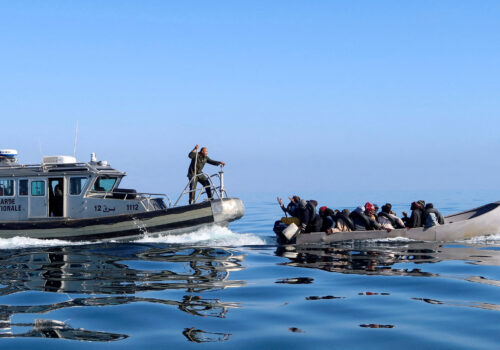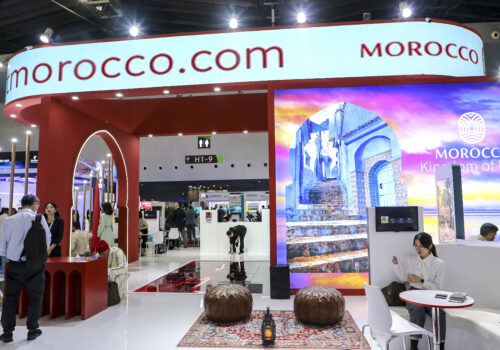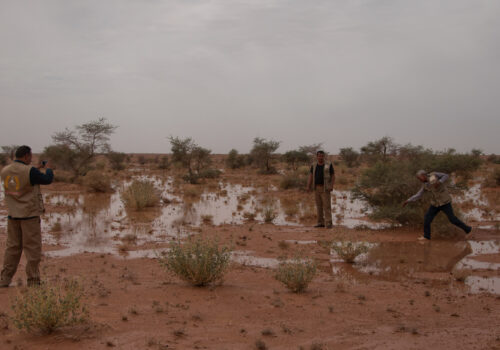How Tunisia’s upcoming presidential elections will erode its democracy
President Kais Saied of Tunisia, who was elected in 2019, has called for new elections this October. While a victory might seem to legitimize his presidency, the West should not be deceived. The upcoming elections are unlikely to be free and fair, due to ongoing crackdowns on opposition leaders and critics, persistent human rights violations, and the consolidation of power across all three branches of government. These elections will likely enable further consolidation of power and undo more than a decade of progress in building democratic institutions. What was once deemed the only success story of the 2011 Arab Spring uprisings seems to be becoming yet another disappointment.
Elected on an anti-corruption platform in 2019, President Saied initiated consolidating powers in 2021 by unilaterally dismissing then Prime Minister Hichem Mechichi and freezing parliament with military support. Saeid subsequently rewrote Tunisia’s constitution to extend his presidential powers and granted himself the authority to unilaterally dismiss magistrates after he dissolved the Supreme Judicial Council. Parliamentary elections he called for had a turnout of just 11.2 percent after opposition parties boycotted them, resulting in the election of mostly unaffiliated politicians close to him. In 2022, Saied extended his control over the Independent High Authority for Elections (ISIE) by granting himself the power to appoint and dismiss its members, nullifying the ISIE’s independence from the executive. With virtually all branches of government now under his direct or indirect control, President Saied has eliminated internal obstacles and monopolized all checks and balances, paving the way for an unchallenged run in October. Consequently, Freedom House downgraded Tunisia’s score from “free” to “partially free,” indicating there is broad consensus among members of the international community that Saied’s actions are illegitimate.
SIGN UP FOR THIS WEEK IN THE MIDEAST NEWSLETTER
In addition to controlling all branches of government directly or indirectly, Saied is cementing his power grab by clamping down on opposition party members, critics, independent media outlets, and civil society. Over the past year, Saied has imprisoned and threatened most opposition candidates. Two of the ten presidential candidates are currently behind bars, while four face prosecution, including Rached Gannouchi—the leader of the main opposition party, Ennahda—who was imprisoned last year on charges of “conspiring against the state” and will remain in prison for at least another three years. Civil society is also facing unprecedented repression, with a draft law currently under revision by Tunisia’s parliament to limit foreign funding streams into the country. Critics and journalists are jailed daily over dissenting opinions, escalating a clampdown on the country’s freedom of expression and emanating fear among critics, enabling the president to run uncontested.
Saied’s legitimacy is also hindered by his continued mistreatment of minorities—including black African migrants and Jews—which has drawn international criticism and led to the violation of international norms. A mass grave with the bodies of sixty-five migrants was recently discovered on the border between Tunisia and Libya, sparking condemnations of Tunisia’s mishandling of sub-Saharan migrants arriving in the country. Saied publicly showcased his antagonism toward black African migrants when, in March 2023, he claimed migrants were threatening Tunisia’s demographic composition, citing the highly controversial “great replacement” theory. A wave of violence against migrants ensued, with many of them losing their jobs and risking their lives. Reports of unlawful mass expulsions toward Algeria and Libya began to emerge, showcasing a well-thought-out strategy by state apparatuses in direct violation of international law, hindering the nascent democracy and Saied’s overall legitimacy.
The local Jewish community, now comprising only 1,500 people, has also felt uneasy and under threat after Saied claimed the devastating floods that hit Libya in September 2023 were a product of the “Zionist movement.” His comments came only months after a terrorist attack occurred in the city of Djerba, each year visited by thousands of Jewish pilgrims, that was believed to have antisemitic motives. More recently, with the outbreak of the Gaza war, several synagogues were lit on fire in signs of protest, elevating the Jewish community’s concerns about its safety. There is little indication of the government taking any action to safeguard the rights of Tunisia’s remaining Jews, raising questions about Saied’s overall motives and his willingness to safeguard minorities.
Saied’s continued clampdown on opposition, his mistreatment of minorities, and his overall control over the three branches of government will allow him to run unopposed in the upcoming polls. While the elections may seem like a legitimate democratic exercise, the context in which they are held is nothing short of an authoritarian regime, whose control over the state apparatuses is becoming more and more evident. This erosion of democratic norms undermines Tunisia’s hard-won democratic gains and is pushing the country further into autocracy.
Alissa Pavia is the associate director of the North Africa Program at the Atlantic Council.
Further reading
Tue, Jun 25, 2024
A world in crisis is good news for North Africa’s political elites
MENASource By Alia Brahimi, Karim Mezran
Europe should not assume that increasing transactional dealings with these elites will produce stability on its southern frontier.
Mon, Jul 1, 2024
Diversification and growth: How the US-Morocco FTA boosts Rabat’s modern trade
MENASource By Amin Mohseni-Cheraghlou
With sustained commitment and strategic planning, the next twenty years can bring even more prosperity and development for the Moroccan economy and greater profits for US businesses operating in the kingdom.
Thu, Jun 6, 2024
Algeria’s Morocco obsession has killed reconciliation prospects
MENASource By
For nearly five decades, Algeria has used the dispute over Western Sahara as a front for its antagonization of Morocco.
Image: Imed Khemiri, a senior official in the Ennahda party and member of the Salvation Front (L) takes part in a protest, demanding the release of imprisoned journalists, activists, opposition figures and setting a date for fair presidential elections in Tunis, Tunisia May 12, 2024. REUTERS/Jihed Abidellaoui


